[Dragon 32, Beyond Software]
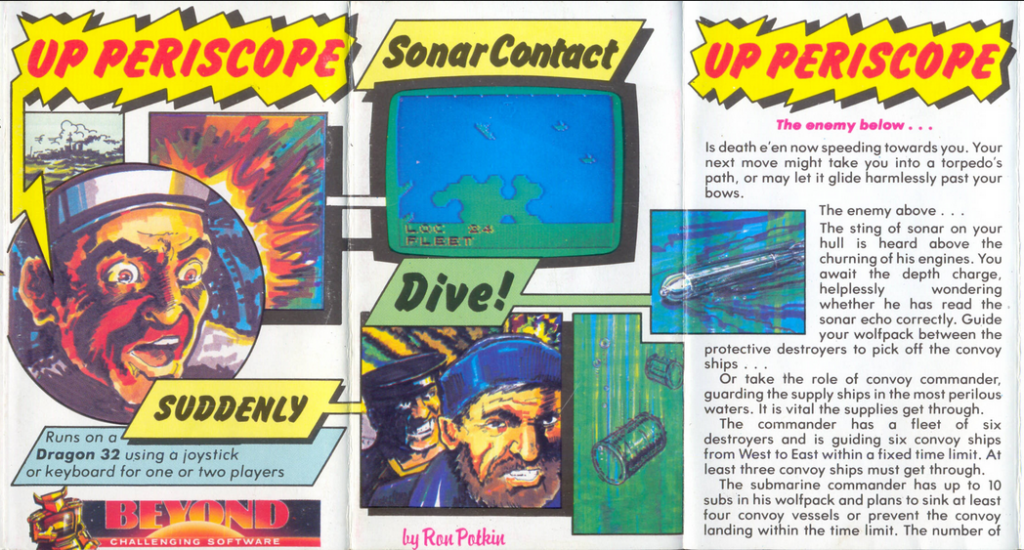
A few days ago, I joined a Color Computer & Dragon 32/64 Discord to ask for support for Ark Royal Games’ Battle of Midway. Battle of Midway still does not work, but thanks to the community I ended up with a list of Dragon wargames I had missed, including Up Periscope. I am neither mad nor disappointed: Up Periscope is the kind of short game I was looking for and it turned out somewhat interesting both as a game and as an introduction to Beyond Software, a company that will soon make video game history with Lords of Midnight.
Up Periscope! belongs to a rare genre on this blog: submarine warfare, or rather, in solitaire, anti-submarine warfare: with my 6 destroyers, I must escort across a map (exactly 2×2 screens large) a convoy of 6 transport ships.
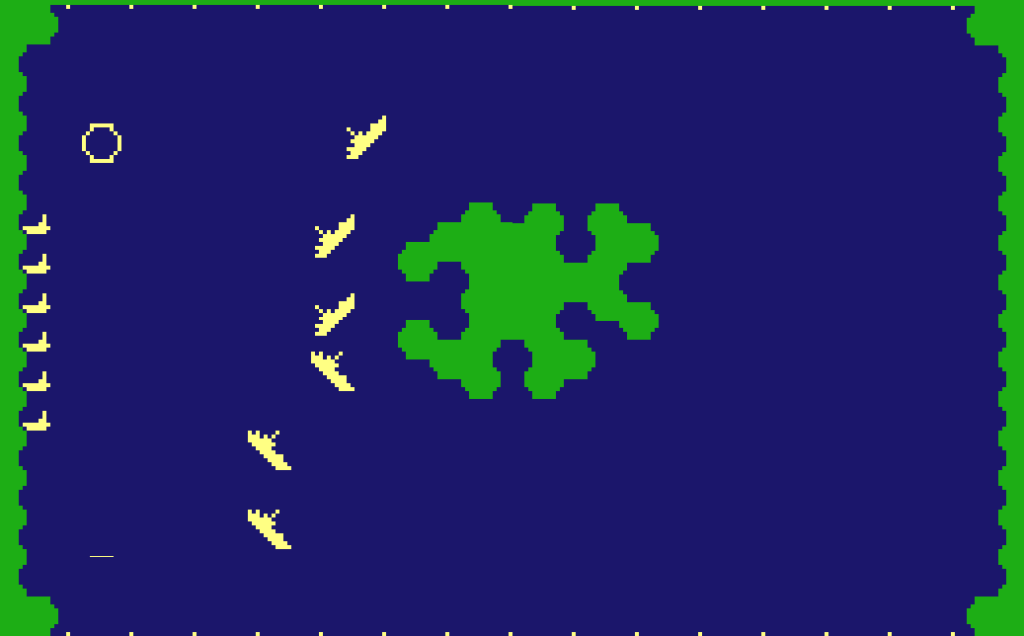
I know there are 10 enemy submarines, and I suppose they start in their half of the map, so for now I am safe. I deploy 5 of my destroyers to the lower half of the map, only leaving one behind in case a submarine tries something funny.
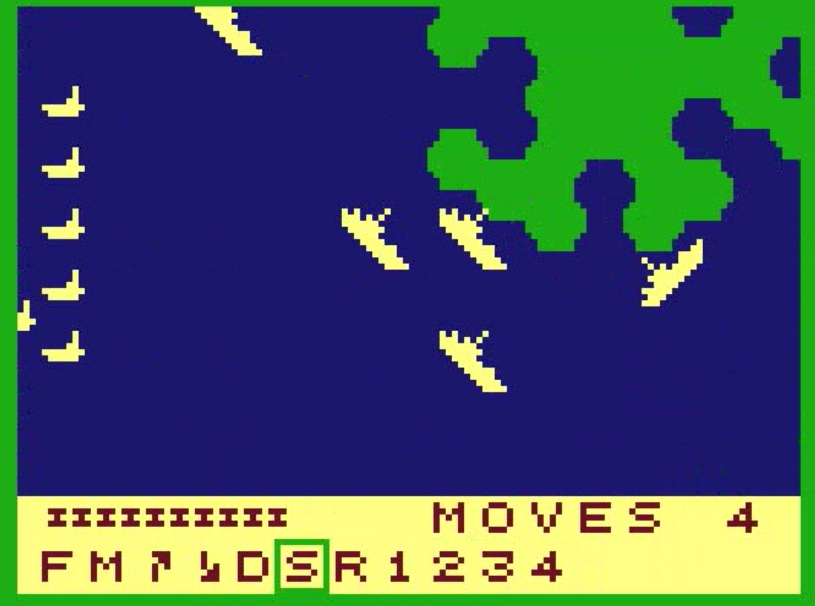
Once I reached the area below the island, I advance carefully. My ships’ sonars have an infinite range, but only along one line of hexagons, so in theory a submarine could be two hexagons from a destroyer and impossible to detect. To mitigate this, I use a systematic approach: use my sonar, advance by one hexagon, use my sonar again, etc. I soon detect a submarine, which I force to surface using depth charges.
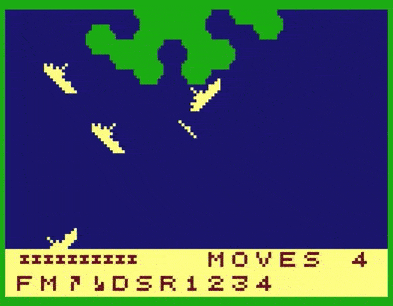
Once it has surfaced, I ram it with another destroyer, and that’s one fewer submarine to worry about.
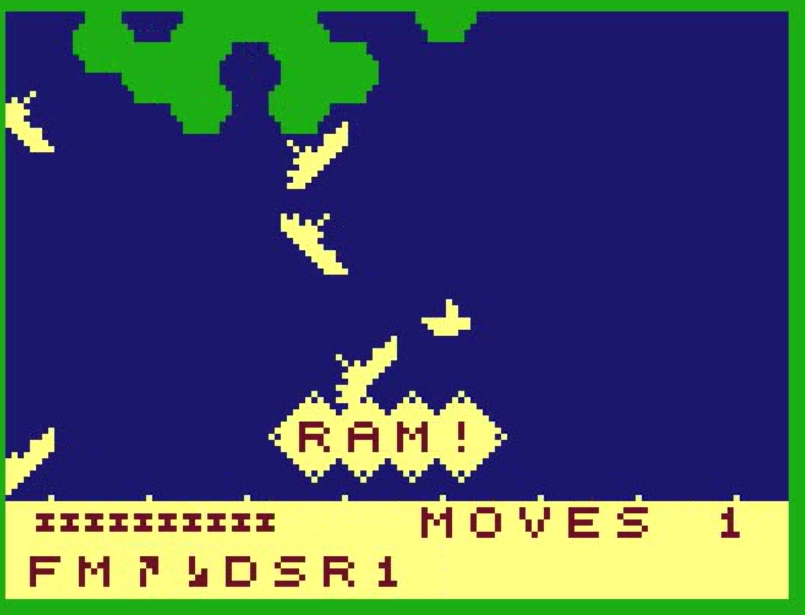
This was turn 2, and after that nothing happens for 3 turns, I barely ping any submarine, and when I do they are too far away to do anything against them. At this point, I have deployed 3 destroyers in front of the convoy and 3 around the convoy. I am apprehensive about submarines that could remain immobile at “sea bottom” where they can’t be detected by sonar, let my convoy pass and then surface and attack, so every turn my 3 “close escorts” ping every hexagon within two tiles of my convoy. It is not totally fool-proof as a submarine could hide directly within the path of the convoy, move to periscope depth and then shoot at point-blank range within a turn, but that’s the best I can do.
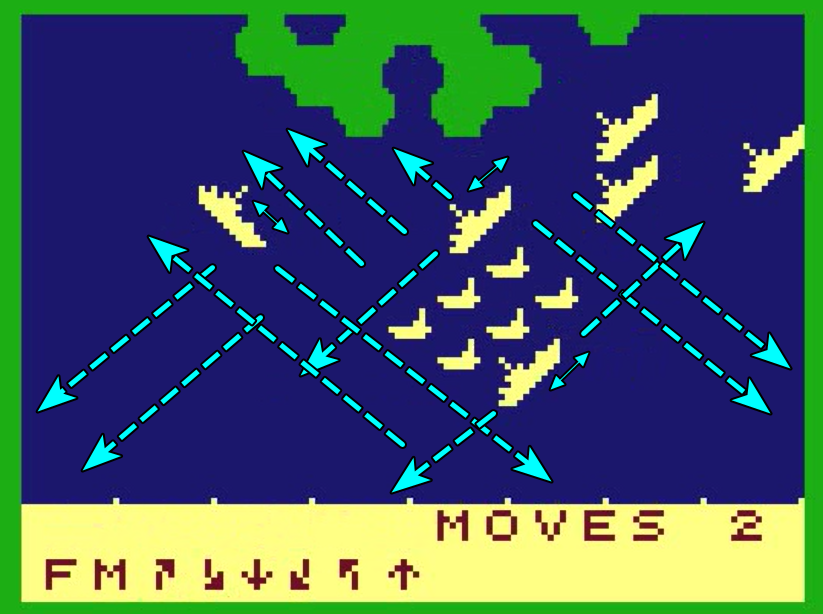
At the beginning of turn 6, I spot a torpedo on the other side of the island. Torpedoes are slow (1 hexagon/turn), but invisible on the turn they are launched, after which they surface and continue on their merry way until they hit something or exit the map.
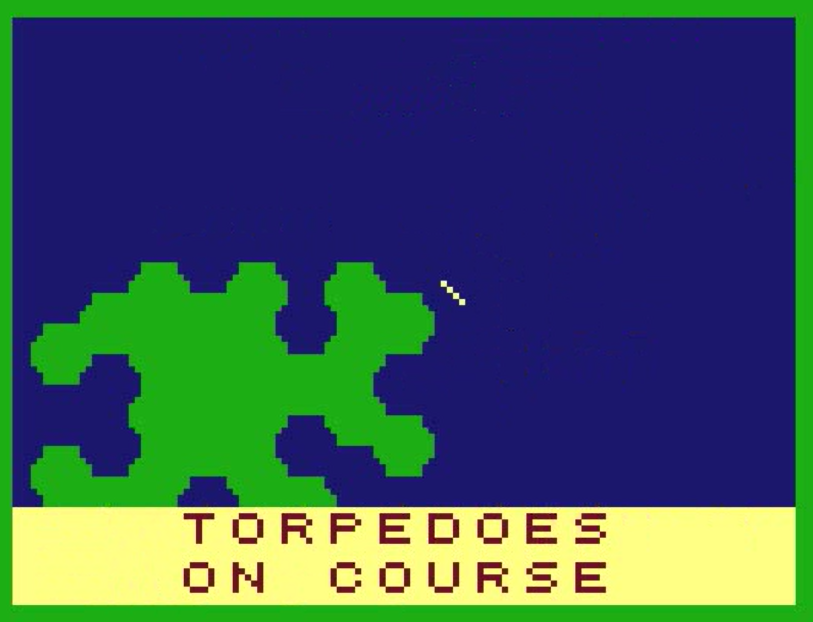
The following turn is a bit more active. I first detect a submarine that I force to surface, but I am out of position to ram her as destroyers are slow to turn (1 action point by rotation). Immediately after that, I detect another submarine and manage to land a depth charge immediately on her, for her doom.
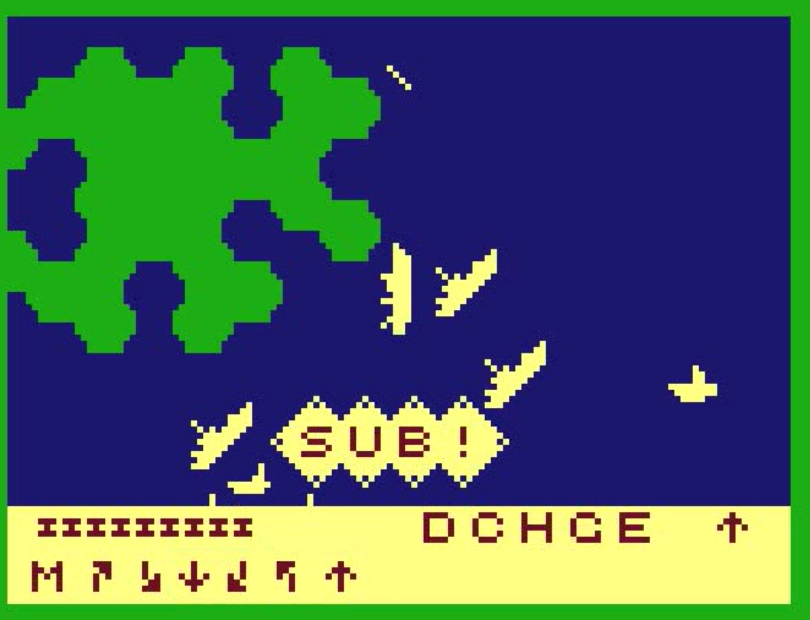
The following turn, I am incredibly lucky. I depth charge the torpedo, just because I can. Doing so, I reveal two enemy submarines – and I only moved one warship. Consequently:
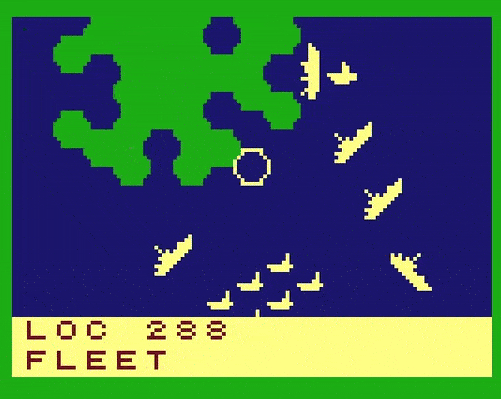
I also find and sink that submarine I found the previous turn, so at the end of turn 8 the situation is excellent: no loss of my side and half the enemy subs destroyed.
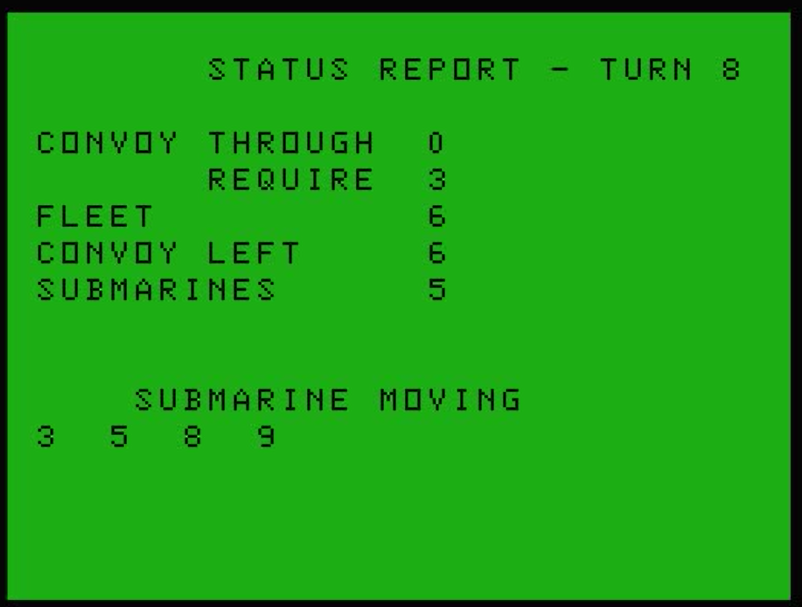
Even better – 3 torpedoes appear at the top of the map, which means at least 3 of the 5 remaining submarines are wildly out of position!
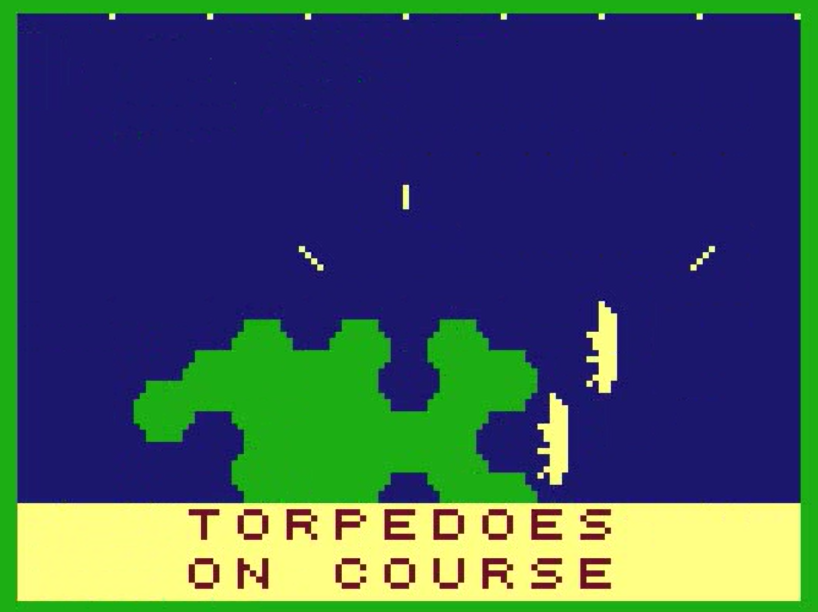
My transports are about 3 turns away from the border of the map, so it’s in the bag.
Well, it’s in the bag, but not without losses. It starts with one of my destroyers backing into an invisible torpedo during a routine sonar search.
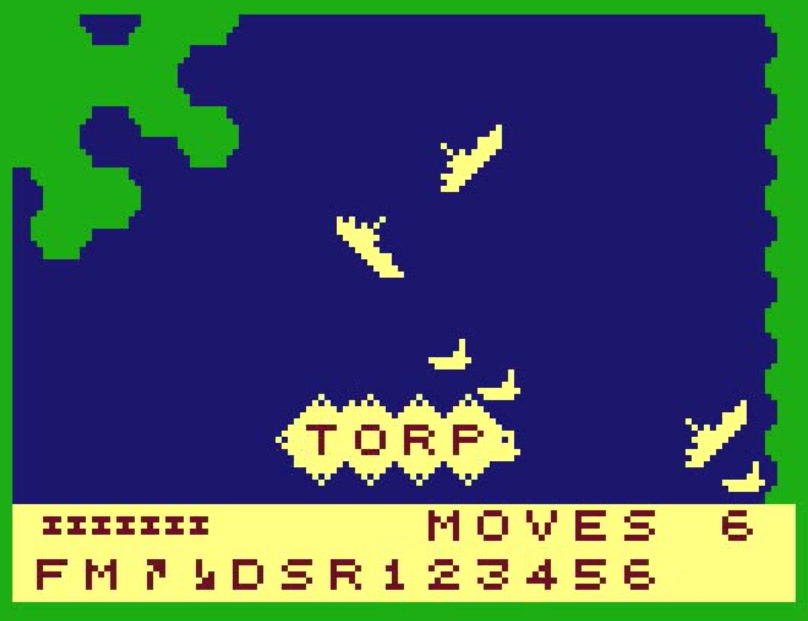
I find and sink the culprit the following turn (turn 10) in addition to another submarine the same turn. My transports exit the map turn 11. Also during turn 11, I lose another ship to a back-into-a-torpedo accident, for a final score that’s not as pristine as I thought it would be, but well, it’s won:
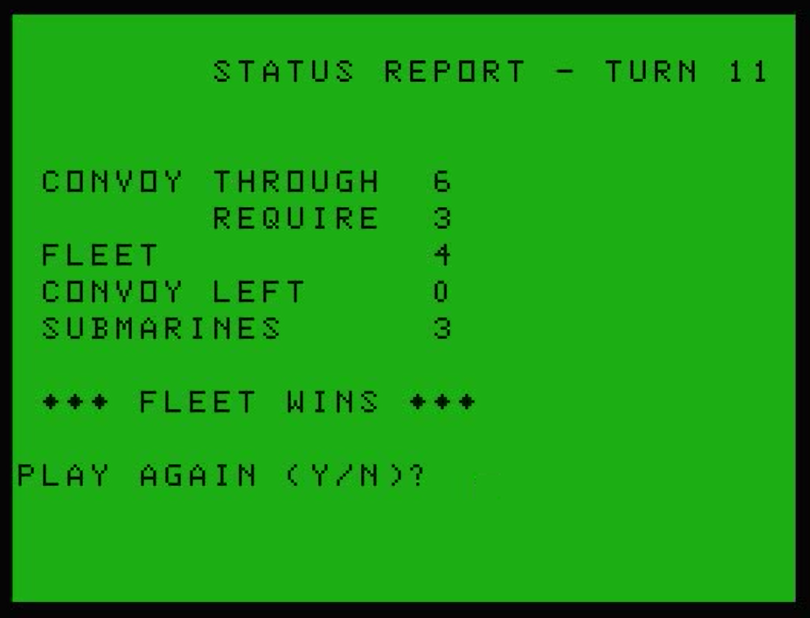
Ratings & Reviews
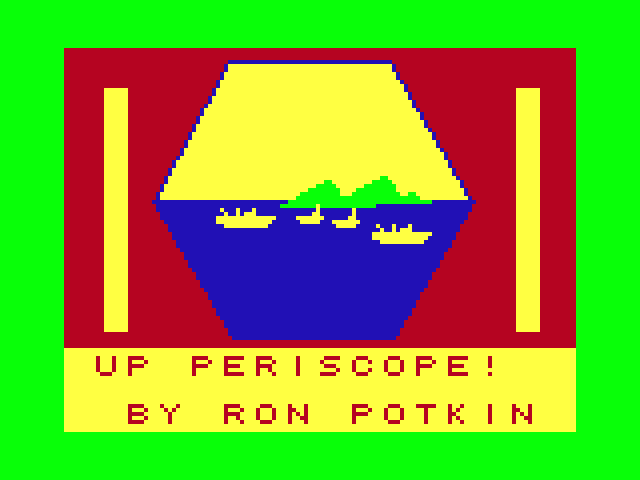
Up Periscope by Ron Potkin, self-published and then published by Softside, US (TRS-80) and Beyond Software, UK (Dragon 32)
First release: 1980 for TRS-80, 1983 for Dragon 32
Genre: Naval tactics
Average duration of a campaign : 60-90 minutes
Total time played: 80 minutes
Complexity: Low (1/5)
Rating: One star
Ranking at the time of review: 40/146
Context – In 1981, publishing giant EMAP (for East Midlands Allied Press, but no one calls them that) took stock of the progress of computer gaming and tasked Terry Pratt to launch a new magazine: Computer and Video Games, launched in October 1981, almost at the same time as the American Computer Gaming World. Computer and Video Games was immediately successful, this despite the poor quality of British games at the time; Pratt even “suggested vaguely to the powers that be the idea of doing some software after seeing the quality of some of the stuff we were getting in on the magazine”. Whether a joke or not, Pratt’s idea was not only greenlighted but actively sponsored. To create Beyond Software, Pratt was allowed to cherry-pick his management team by poaching within EMAP’s staff.
As for his dev team, Pratt could count on another pool of talents: all those developers who had contributed their listings to Computer and Video Games. This allowed Beyond Software to move fast, but at the cost of a lack of cohesiveness. While Simon Goodwin, Beyond’s only in-house developer, coded SS Achilles on Atari, Paul Jay wrote Goodness Gracious for the Commodore 64, Pat Norris wrote Space Station Zebra for the ZX Spectrum and finally Ron Potkin wrote Up Periscope and Kriegspiel for the Dragon 32.
In 1983, Potkin was one of the most experimented British developers. He had a headstart by virtue of living in Texas at the onset of personal computing and acquired a TRS-80 as early as 1978. There, he published several games through Softside, and by late 1980 he had 3 games to his name: Kriegspiel, Up Periscope and Warpath – all of them wargames, all of them TRS-80 and all of them two-player only, hence the reason for which I did not cover them thus far.
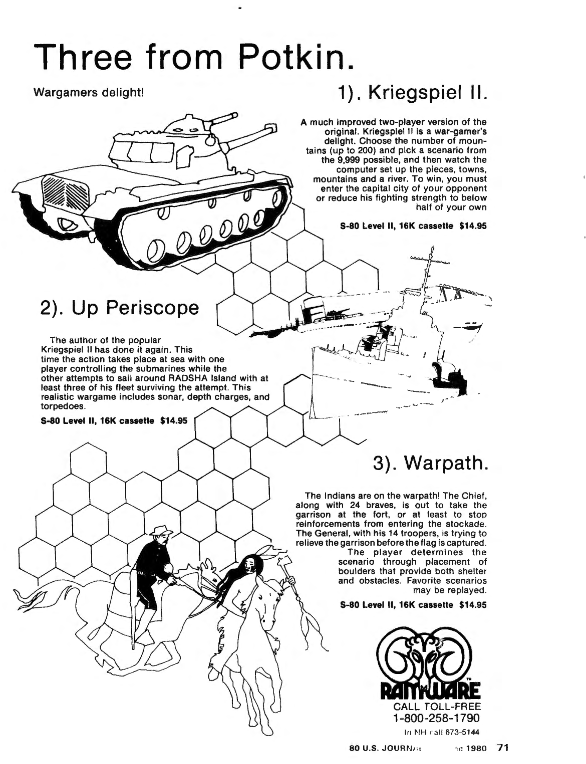
Potkin returned to the United Kingdom in 1982, and with his reputation reset, he proceeded to republish Warpath as a didactic and episodic listing in Computer and Video Games. The code for Warpath spanned over 7 issues from January to July 1983, making it I believe the largest listing ever published by the magazine.
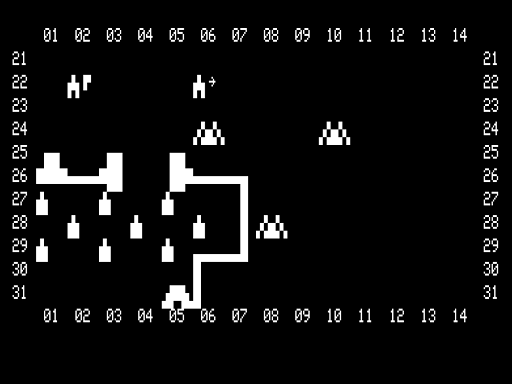
Potkin’s contribution to Computer and Video Games put him on Pratt’s shortlist, and this was just perfect for Potkin as he had two other games to his pedigree that had not crossed the Atlantic: Up Periscope and Kriegspiel. The TRS-80 was not a major platform in the UK, and while it had been acceptable to publish a listing for TRS-80 with the port to a more popular British platform left as an exercise to the reader, it would not do for a commercial product. Potkin therefore converted his two games to the Dragon 32, a British compat’ to the TRS-80 Color Computer, and used the opportunity to add a solitaire option to both games. Up Periscope and the more ambitious Kriegspiel were both published by Beyond Software in 1983.
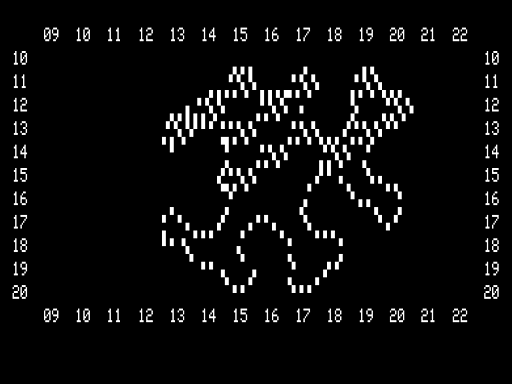
Traits – Up Periscope has a limited scope, but what it does it does well, provided you are not too attached to historicity and that you like puzzles (“how many hexagons within range can I ping this turn”). Potkin made good design choices usually favouring gameplay over realism, for instance the sonar pinging a lane rather than an angle (allowing submarines to hide better), or making the destroyers slower to turn than submarines. I also appreciate that Potkin limited the number of torpedoes and depth charges so you can’t spam them, but put the limit so high that if you use them properly you will never run out.
The submarines are properly sneaky, but I wonder whether in multiplayer the submarine side does not have too much of an advantage. With 6 action points every turn, a submarine can remain invisible in the depth until a transport approaches, and then climb to periscope depth (1 action point), move once (2 action points at periscope depth), send a torpedo (1 action point) and dive again (1 action point). But then, possibly, this does not work because the submarines must sink 4 transports to win, and such a passive ambush tactic would force the submarine player to spread out too much to sink 4 transports quickly.
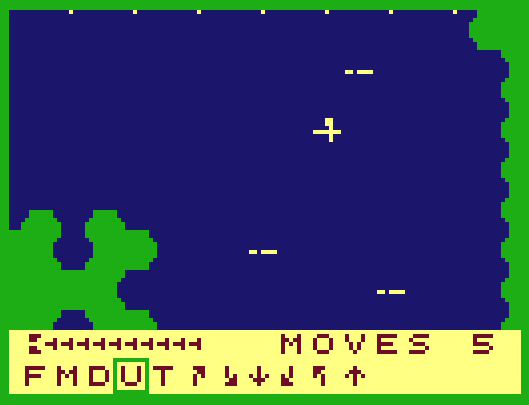
Up Periscope has one flaw, however: controls. Movement is way more time-consuming than it needs to be. To accommodate Joystick players, the game calls a control panel at the bottom of the screen when you select a unit. Unfortunately, you cannot press, say, “D” for Depth Charge on your keyboard – you need to navigate to this order with the arrow. Given destroyers and transports have respectively 7 and 4 action points every turn, you will have to go through this procedure up to 7 times by destroyers and 4 times by transport. Tedious, particularly given how slowly and systematically you need to move. The computer also takes its sweet time to play its turns – 80 seconds for 10 submarines – so all included playing one turn takes between 7 and 10 minutes! Without this issue and with slightly more scenario parameters to play with, I would have certainly played it more.
Did I make interesting decisions? Yes, though it played more like a puzzle game with occasional “should I risk it?” decisions
Final Rating: One star. Up Periscope has a narrow scope but turned out to be a good surprise from a developer who knew how to bite as much as he and his computer could chew. A pity the game is so slow to play. I am looking forward playing his Kriegspiel.
Reception
Up Periscope received few reviews, typically warning that the game was slow but well-designed if you were into the genre – this is for instance the case of the review found Personal Computer News (March 1983): “This may not be the greatest of games, but it’s better than average and should appeal to the strategy fans.” Dragon User (March 1984) is more positive, reckoning Up Periscope “is a well-thought-out game of strategy that should while away those long winter evenings.” Finally, the French Tilt gives it 5 stars in its March 1985 article on all naval warfare games… but then it gave 5 stars to almost half the games reviewed, so all we can conclude is that Up Periscope is in the top half. I certainly agree.
Edit 03/12/2024: With archive.org back, I added contemporary reviews and found out that Ramware under which Potkin first published his games was effectively an early name for Softside’s “The Software Exchange”.